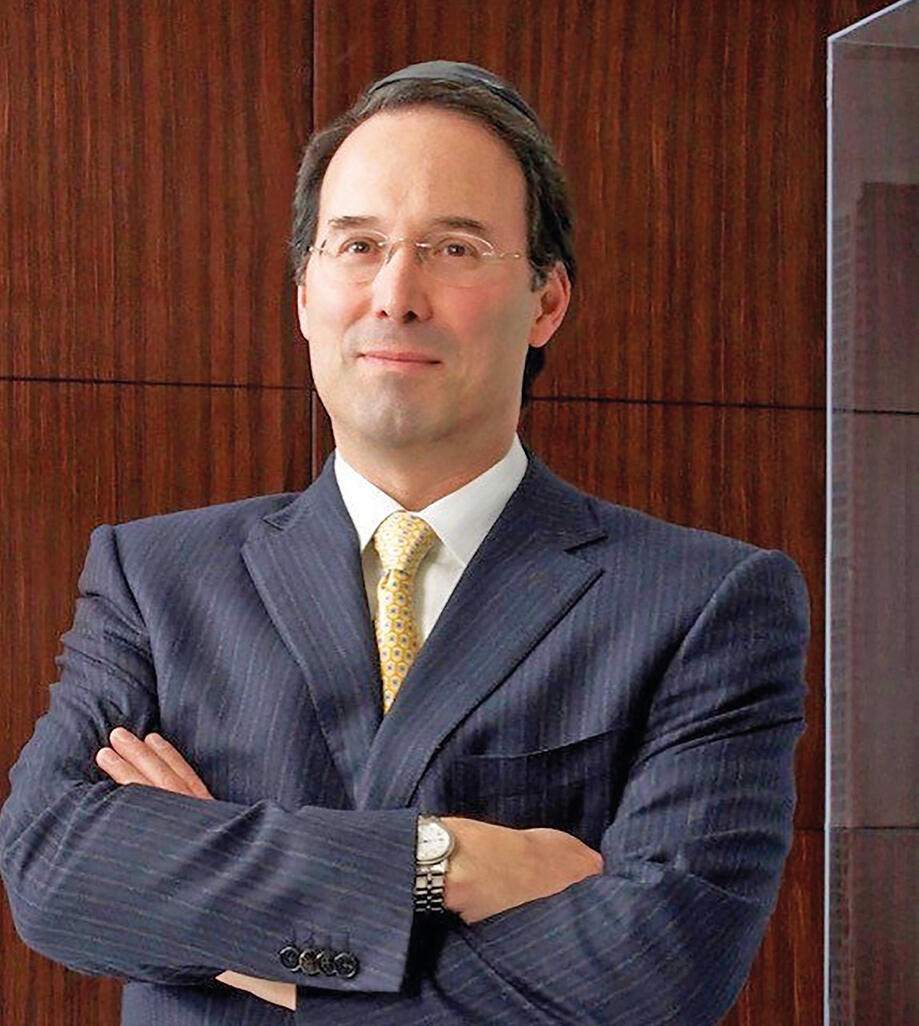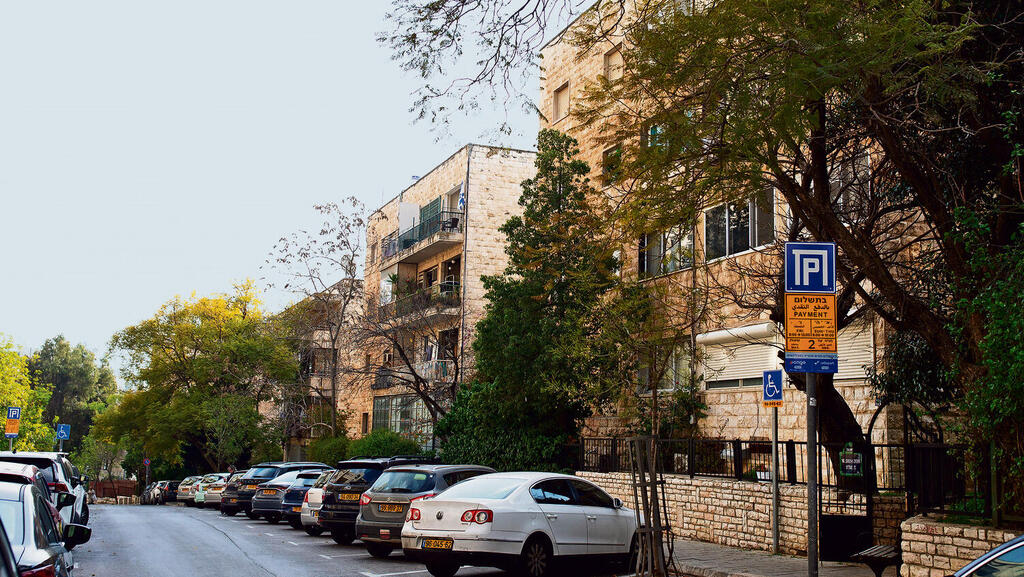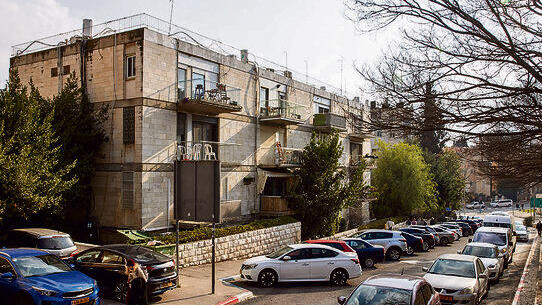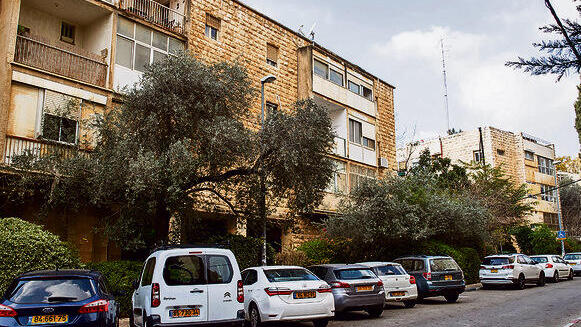"We paid a lot of money for this land, and we're not going to give it away for free," says Gary Barnett, the Jewish-American developer behind the controversial real estate deal described as the biggest in Jerusalem in the last 100 years.
A year ago, Barnett completed the massive acquisition for no less than 750 million shekels, purchasing 130 acres in the heart of Jerusalem—land previously owned by the Greek Orthodox Church. However, since then, he has encountered challenges that cast doubt on the feasibility of his massive project.
Barnett’s main obstacle is opposition from many of the tenants living on the land, who refuse to reach an agreement that would allow large-scale urban renewal projects, including the construction of thousands of new housing units. The vast area in Rehavia, Talbiya and Nayot neighborhoods includes some of the most central and expensive streets in the city.
It currently holds around 900 housing units, well-known hotels such as the Inbal, Prima and Dan Panorama hotels, public buildings including part of the Great Synagogue and the Israel Museum, open spaces, and over 12 plots designated for development.
Despite skepticism from the real estate sector regarding Barnett's ability to execute his ambitious plan, he asserts in the interview that he has no regrets about the deal, for which he spent hundreds of millions of his own money.
"I’ve been involved in many complicated and challenging deals in America," he says. "Extell, my company, is among the top five development firms in the U.S. We have built in Boston, Chicago, and Miami, and we have a major project in Park City, Utah. We are developing a massive ski and resort site, which is an extremely complex deal. We had to merge over 20 transactions to create the site and secure permits worth billions of dollars."
'Something big and creative'
Barnett, 69, was born on New York's Lower East Side to a father who was a rabbi and a teacher and a mother who was also an educator. He grew up in New York and in the nearby city of Monsey as one of 12 children.
"My father was born in Europe before the war and spent three years in Israel in the 1930s," he shares. "My mother was born in America but also spent several years in Israel in the 1930s. We were a large, poor family. I got married and moved to Belgium, where we lived for 12 years. My wife became ill and passed away after a three-year battle.
"I remarried, and when I returned to America, I was already in real estate. I managed my business from Belgium for a few years and was also involved in the diamond trade, but when I moved back to the U.S., I shifted entirely to real estate, starting with acquisitions and later moving into development."
Why did you decide to invest in Israel?
"My family and I love Israel deeply, and I have visited many times. Most of my children (Barnett has eight) studied in Israel for at least a year. Over the years, people kept asking me, ‘Why don’t you build there?’ and I never really found the right project for me. But of course, it was always a dream — to build and own something in Israel.
"When this opportunity came, it seemed big and creative enough for me to get involved. Beyond urban renewal, we also own land where important institutions like the Israel Museum and the Great Synagogue are located, and we want to help secure their long-term status. I truly believe this initiative will bring good for everyone, but it requires goodwill from all sides," he says, referring to the Jewish National Fund (JNF), the Jerusalem Municipality, and the opposing residents.
Residents claim they have become hostages in their homes.
"Naturally, people are skeptical. I understand why residents—those who live in the apartments, not investors—are initially distrustful. Many have had bad experiences with empty promises. But we have a 30-year history of successful deals and keeping our word.
"When I started my career in 1994, we had a similar situation in America. We bought a building on Manhattan’s Upper West Side during the longest rent strike in New York history—nine or 13 years. The tenants, who were politically active and savvy, had stopped paying rent because the landlord neglected the building. My partners and I saw the potential in the property, met with the tenant leader, and reached an agreement. We renovated the building, increased rents and never had any legal disputes afterward.
"One of the tenants was a rabbi with ten children. He paid $273 per month for a ten-room, 400-square-meter apartment. The court ruled we could increase his rent to $1,500, still an extremely low price for that space in Manhattan. Of course, he couldn't afford it, but we didn’t evict him. Instead, we bought him a house in Monsey, and he moved there. It was a very happy ending. Later, we renovated his old apartment and rented it for $20,000 a month.
"Bottom line, we did not come to Jerusalem to evict people from their homes. In any case, there are 25 years left on the lease, so there’s no immediate threat. We came to Israel with goodwill, and we believe our plan is a win-win for everyone."
'There are those stirring the pot'
Barnett’s acquisition was finalized in January 2023 with the seller, the Jerusalem-based Ben David family’s company, Nayot Komemiyut. The land was originally leased by the Greek Orthodox Patriarchate to the Jewish National Fund (KKL-JNF) in the 1950s for up to 99 years (until 2052), with an option to extend.
The KKL subleased the land to tenants. In 2016, Nayot Komemiyut purchased the land rights from the church, continued leasing to the KKL, and even offered tenants the chance to purchase full ownership of their homes. Some deals have been completed, including the sale of Villa Sherover, President Hotel, and other apartments.
Two years ago, Barnett, along with several Jewish-American investors, acquired the land. To manage it, he established Extell Israel, which he controls. This company has no corporate affiliation with Extell Development in the U.S., one of New York’s top three real estate firms with multi-billion-dollar holdings.
Barnett faces a complex real estate puzzle. The land leases expire in 25 years, raising concerns among tenants who don’t own their apartments. Barnett does not intend to renew leases, aiming instead to push forward an urban renewal plan.
He offers tenants a choice: purchase ownership for a reduced price or extend their lease until 2100 without payment. However, many tenants oppose the deal, fearing high taxation costs. Some also criticize the limited 12.5-square-meter expansion he proposes for their new apartments, arguing that larger additions are approved in similar projects.
The objections forced him to submit a new, improved proposal to the residents last November. Barnett’s initial proposal to the residents offered them ownership of their apartments in exchange for a payment based on different tiers: Approximately 3,000 shekels per square meter (about 300,000 shekels for a 100-square-meter apartment) for residents who owned the property before 2019. Around 5,000 shekels per square meter for those who own the apartment as a secondary property, such as foreign residents.
Approximately 6,000 shekels per square meter for those renting out the apartment as an income-generating property. Around 9,000 shekels per square meter for those who purchased the property from 2019 onward. Barnett defines the latter as speculators, arguing that those who bought after 2019 acquired the properties at significantly lower prices compared to market rates.
"Less than 50% of the apartment owners actually live in them, meaning about half of the leaseholders are investors," Barnett says. "Some inherited the apartments and rent them out, but most are investors who, just like us, want to achieve financial success. The value of these apartments decreases every year.
"For those living in them, it might not matter much — they will stay for another 25 years, and whatever happens, happens. But what happens if they need to sell? The residents can either extend their lease or obtain full ownership. Clearly, ownership is the better option."
Extell claims that only 7% of the residents are the original leaseholders of the apartments and that 25% purchased them between 2000 and 2010 at a price 10%-20% below market value. After that, according to the company, the price was already 20%-40% below market rates. The company also asserts that about 25% of the leaseholders are not Israeli citizens.
The improved offer
In November, Extell improved its offer to the residents, presenting two options: Ownership of the apartments or Lease extension until the year 2100 at no cost.
Additionally, the payment required for ownership was reduced. The new model is tiered: First tier: Longtime residents who have lived in the apartments since before 2019. Those opting for ownership can forgo a 12.5-square-meter expansion under the redevelopment plan and receive ownership for free. If they want the extra space, they will pay 2,000 shekels per square meter. Those who choose to extend the lease will receive the additional space at no cost, but without ownership.
Second tier: Residents who do not live in the apartment and rent it out. If they choose ownership and want the 12.5-square-meter expansion, they will pay 4,000 shekels per square meter. Third tier: Residents who purchased the apartment after 2019. If they choose ownership and want the 12.5-square-meter expansion, they will pay 6,000 shekels per square meter.
According to calculations by Extell, a 100-square-meter apartment in Talbiya is currently valued at approximately 2.95 million shekels under leasehold status. Transferring it to ownership would increase its value to 4.85 million shekels.
After the redevelopment, the apartment would become a new 112.5-square-meter unit valued at approximately 7.87 million shekels. The company claims this deal would significantly increase the value of the apartments for residents. However, many remain opposed to the offer, partly due to concerns about high tax costs when purchasing ownership.
Real estate appraiser Kobi Bir, an expert on church-owned lands, explains that church-owned lands pose challenges even for lease extension:
"On lands owned by the Israel Land Authority (ILA), lease renewal is almost automatic at a cost of 5.5% of the land’s value. However, on church-owned lands, the situation is different: renewal fees apply not only to the land but also to the buildings on it, and they are full lease fees—not the symbolic 5.5% charge.
Get the Ynetnews app on your smartphone: Google Play: https://bit.ly/4eJ37pE | Apple App Store: https://bit.ly/3ZL7iNv
The Jewish National Fund (KKL-JNF) would have to pay the landowners a much higher amount than it can collect from residents, creating a significant financial gap and taxation issues. A lease renewal transaction is considered a real estate transaction for tax purposes. Since the renewal is based on the market value and not a symbolic lease fee, the tax on the renewal will be at full market value."
From Barnett’s perspective, if he manages to reach an agreement with all 900 residents, and they all pay at least the minimum amount instead of opting for lease extension, the total revenue from the ownership transfers alone would be around 180 million shekels, even before advancing the urban renewal project, which would include selling hundreds of new apartments at market prices.
Why does the new offer include an expansion of only 12.5 square meters per apartment, rather than a larger increase, as seen in similar projects? Will there also be balconies?
"Unlike a regular urban renewal project where residents bring the land and apartments into the deal while the developer handles the redevelopment, this situation is different," Barnett explains. "Moreover, our offer provides a significant discount on ownership compared to market prices, granting residents a substantial financial benefit. Regarding balconies, where feasible from a planning perspective, we will certainly include them, but this depends on final approvals from the local planning and building committee."
Can residents receive an official commitment from KKL-JNF and the Israel Tax Authority that the project can proceed in order to gain their trust?
"An official commitment depends on receiving formal agreements from KKL-JNF and the Tax Authority. We are in discussions with the relevant parties and examining the possibility of obtaining such approval.
"It's important to understand that while the contracts grant KKL-JNF the right to extend the leases for additional years, the cost of extension will be determined based on market value—not just for the land but also for the buildings on it, along with undeveloped land value. This cost will be based on projected market values in 2050, when the current leases expire."
"Not all residents have the funds to pay," Barnett acknowledges. "Like the rabbi in New York, we understand that. Therefore, if a resident cannot afford the payment, they will only need to pay when they sell the property or transfer it to their heirs. We never intended to pressure people who cannot afford it. We didn’t come to Jerusalem to cause trouble. Those who think our offer isn’t good enough simply don’t understand it."
He also claims: "Some people are stirring the pot, arguing that they shouldn’t have to pay anything for ownership. But we paid about 800 million shekels for the land (750 million for the deal plus additional taxes). The Israeli government practically gave away its land for free, so some people seem to think we should do the same. We know that one of the residents’ lawyers represents a client who wants to push his own redevelopment project on these lands."
Opposition to the proposed law
In July, coalition and opposition lawmakers advanced the "Fair Leasehold" bill, which applies to church-owned and Christian monastic lands. It would grant tenants the right of first refusal to purchase their apartments and extend their leases for another 50 years at 5.5% of the land's pre-development value. If passed, this law would significantly delay Barnett’s ability to proceed with urban renewal on the lands he purchased.
Real estate appraiser Bir adds that church-owned lands have become a diplomatic issue: "Attempts to resolve the problem through legislation, such as the Fair Leasehold bill, faced strong opposition from the churches, even leading to the temporary closure of the Church of the Holy Sepulchre as a protest. The churches argue that such legislation would harm their ability to sell land in the future."
During his visit to Israel in November, Barnett did not hide his opposition to the bill, stating in the interview:
"I told the residents: if you think the Knesset will pass a law that will take our land away, it will end in 10-15 years of legal battles, and your properties will only lose value. And then, don’t expect anyone to negotiate with you."
"Extell's position," says Barnett, "is that the proposed law in its current form is far from providing a fair and balanced solution. In fact, it disproportionately infringes on private property, interferes with freedom of contracts, and could potentially harm the certainty required for investors in Israel. Beyond that, as I understand it, it may also harm churches in Israel and relations with the Christian world.
"In fact," he adds, "a comparison between the proposed law and Extell's current proposal reveals that, in many ways, our offer is better. It grants ownership to some tenants without payment, and to others at a very low price, close to what they would be required to pay under the proposed law. It is correct and far preferable for all parties to reach agreements rather than engage in lengthy legislative processes and legal petitions, which will only prolong the existing uncertainty unnecessarily."
Does your proposal address tax aspects?
"Yes. The company is working in collaboration with expert tax advisors to minimize the exposure of lessees and the company to unnecessary taxation within the framework of the project. As explained to the lessees, the proposal is subject to obtaining relevant tax exemptions, within the framework of urban renewal and in general."
Will the tenants be able to receive ownership immediately?
"The transfer of ownership is expected to occur at the time of evacuation from the apartment, ensuring that all parties are secured. If the tenant is required to pay for the ownership, they will do so only then, and not a moment earlier."
Throughout the interview, Barnett repeatedly shifts the responsibility to the Jewish National Fund (KKL-JNF) and the Jerusalem Municipality, clarifying that they must assist the company in advancing the deal due to their public responsibility for the overall solution. "In all our discussions with the KKL and the Jerusalem Municipality, we were told that we must offer the tenants a very good deal," he says.
"We need the KKL and the municipality to support the deal, but practically, there is still no cooperation. We need to hold further discussions. It is clear that if they tell the public that they should receive more, it will ruin it for us, and they have the power to do that. But based on what they have told us in the past, it's hard for me to see them not agreeing. They still need to move from the theoretical stage to the practical stage, but we recognize that they want to resolve the issue."
Do you think the KKL will renew the lease?
"If the KKL renews, it will effectively agree irreversibly to pay hundreds of millions annually. If it passes this on to the tenants, it will be very unsuccessful for them, and if not, it involves providing subsidies of hundreds of millions annually to tenants, instead of using these funds for other purposes that the KKL promotes.
"In light of the attractive offer on the table, where the tenants will receive ownership, not a lease, without any payment from the KKL, it's hard for me to imagine the KKL passing on a win-win opportunity. We have now seen a very good response from many more tenants saying, 'Okay, this is what we've been waiting for,'" claims Barnett.
'Resolving the issue'
Alongside the many objections from tenants who have not yet agreed to the deal, there are those who would like to move forward with Extell. "I have an investment apartment in the best place in Jerusalem, and I know that when we get older, I want to live in the Talbiya neighborhood with my wife," says an investor from the central region, who asked to remain anonymous.
"We purchased the apartment in August 2023, just before the war, and we understood that we were entering into lease agreements until 2052. I told myself that this must be resolved because what will happen in 25 years? Will people be evicted from their homes? Just when we saw that Extell had purchased the lands, I understood their financial strength and capabilities.
"I saw their projects in New York, and I told myself that if such a body comes to a place like Jerusalem, it will probably do serious work there. I assumed they didn't pay 750 million shekels for lands to wait until 2052 to do something with them.
"We bought with the understanding that the new landowners would upgrade the entire complex. You don't need to be a real estate person to see the buildings around and understand the potential of new structures. From meetings we held with Extell and with Gary himself, we were impressed that there is an intention to promote respectable projects.
"I understand the opponents, who are afraid and don't want to be suckers, but I say: I hold a property under lease for another 25 years. If someone offers me a reasonable offer with a reasonable addition to get ownership and a better apartment - I'm happy.
"I know that it's possible to get an addition of more than 12.5 square meters; there are contractors here who offer tenants an addition of 25 square meters per apartment, and I agree that one shouldn't agree to a deal hastily, but they forget that the situation here is not normal; the apartment is not ours, and they are offering us ownership of it."
In the residents' protest headquarters, they are less happy. The headquarters stated: "Gary Barnett and his group continue to intimidate the tenants, threatening that they will be evicted from their homes if they do not agree to Barnett's draconian and unilateral terms, while applying heavy pressure on elderly people and foreign residents through mailboxes, email, and phone continuously.
The state and the KKL must end this saga and the loss of control over vast areas in the heart of Jerusalem by quickly completing the legislation and exercising the KKL's right to extend the lease without the need to dip into the public pocket. This is also the simple solution for the KKL, due to complex contractual obligations, including full compensation and lease periods crossing the year 2052 for some lessees.
"Extell is trying to divide and conquer between lessees, to create conflicts between buildings and complexes, and to ride on the tenants' rights on the way to obtaining the coveted approvals from the KKL, the Jerusalem Municipality, and the Knesset, approvals that it is light-years away from receiving.
"The Fair Lease Law currently being promoted was passed in a similar version in the British Parliament and other countries and was approved by the European Court of Human Rights as proportionate and just. The law is supposed to regulate the issue, including tax issues, in a way that preserves the tenants' rights and does not allow any land speculator to do with them as they please.
"This whole situation was born in sin, without the tenants' knowledge and behind their backs. Signing with Barnett and Extell is a clear own goal and a very problematic tax event, and therefore the vast majority of tenants do not succumb to his intimidation campaign about long legal proceedings and eviction."
The Jerusalem Municipality stated: "The mayor is monitoring developments on this issue with concern. Although this is not a municipal matter, it is of great importance to a large segment of the city's public. The mayor has clarified that the issue should be resolved at the national level, through legislation or other arrangements, provided that this does not come at the expense of the leaseholders.
|"He has informed the developer and the leaseholders that the Jerusalem Municipality will not permit the advancement of plans within its jurisdiction on church lands until the matter is settled. When such a settlement is on the table, the municipality will take the necessary steps to assist. Ultimately, these are leaseholders who have acted honestly and in good faith and deserve protection and assistance."
KKL-JNF declined to specify their position regarding the deal and only stated: "KKL-JNF was not and is not a party to the transaction for the sale of rights to the Jerusalem Lands Company (Extell Israel), nor did it receive any notification of the intention to carry it out.
"However, recently there has been dialogue between company representatives and KKL-JNF professionals. In this context, KKL-JNF clarified its position regarding its rights, including its right to extend the lease period. Additionally, although KKL-JNF is not the entity representing the sub-lessees and residents, it places great importance on protecting their rights and acts accordingly."






